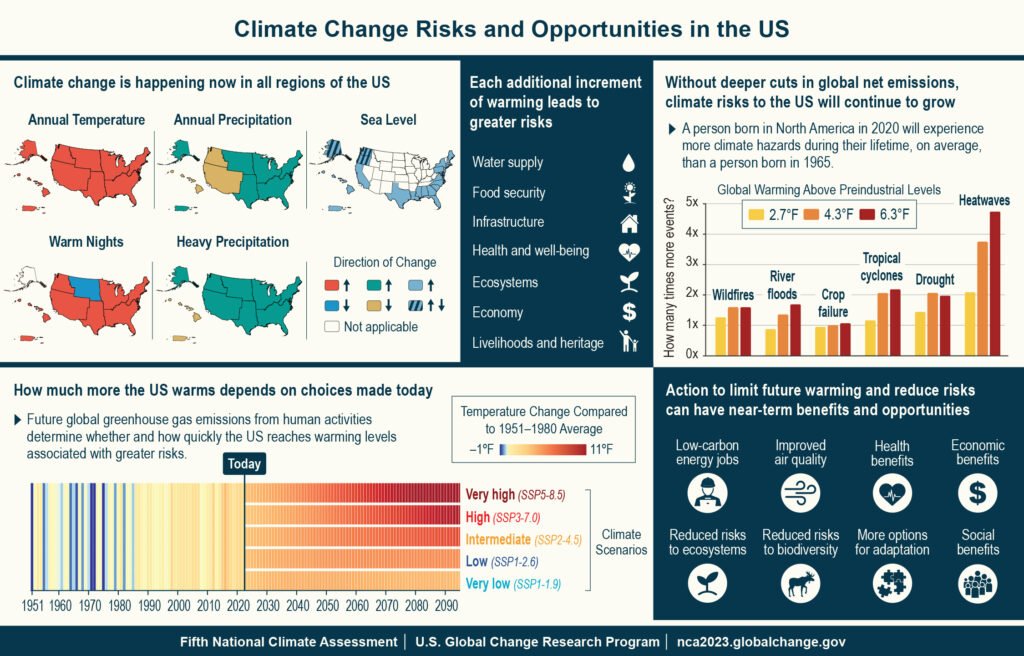Climate Snippet
A holistic approach to climate risk in agriculture is crucial for effective climate action. Climate risk in agriculture is multifaceted, encompassing environmental, socio-economic, technological, and regulatory factors. Integrated frameworks that combine scientific research, policy, technology, and finance are needed. Successful case studies highlight the importance of water investment, innovative agricultural practices, and community engagement. Overcoming barriers to implementation requires collaboration among stakeholders. By adopting a holistic approach to climate action, a resilient agricultural sector can be built to withstand climate change challenges.
Climate Action
- Understand the multifaceted nature of climate risk in agriculture
- Develop integrated frameworks combining scientific research, policy, technology, and finance
- Utilize scientific insights to guide resilient agricultural practices and technologies
- Shape policies and regulatory frameworks to address climate change impacts on agriculture
- Secure financial support for implementing climate-smart agricultural practices
- Learn from successful case studies on water investment, innovative agricultural practices, and community engagement
- Overcome barriers to implementation, such as lack of awareness, insufficient funding, and resistance to change
Introduction
Agriculture sits at a unique intersection of vulnerability and opportunity in the face of climate change. It is a sector deeply impacted by climate risks, from altered weather patterns to water scarcity, yet it also holds immense potential for mitigating these very risks. To harness this potential, a holistic approach to climate risk in agriculture is not just beneficial—it’s essential. This blog post delves into why and how a comprehensive view of climate risk can lead to effective climate action in agriculture, ensuring a sustainable and resilient future.
The Multifaceted Nature of Climate Risk in Agriculture
Climate risk in agriculture is not a single-thread issue. It encompasses a wide array of factors, from environmental to socio-economic, technological to regulatory. Understanding these interconnected risks is the first step in developing a holistic approach. For instance, water scarcity, a critical challenge highlighted by recent studies and reports, affects not just crop yield but also influences the entire agricultural supply chain and the livelihoods of farmers.
Environmental Risks
The environmental aspect of climate risk involves changes in weather patterns, increased frequency of extreme weather events, and the gradual shifts in climate zones. These changes directly impact crop productivity, soil health, and water availability, posing significant challenges to traditional farming practices.
Socio-Economic Impacts
The socio-economic impacts of climate change on agriculture are profound. Marginalized communities often bear the brunt of these impacts, facing food insecurity, loss of livelihood, and displacement. Additionally, the economic structures supporting agriculture, like crop insurance and market prices, are also affected by climate variability.
Technological and Regulatory Challenges
Adopting new agricultural technologies and practices is essential for climate resilience. However, this transition poses challenges, including access to technology, training, and funding. Moreover, regulatory frameworks play a crucial role in shaping agriculture’s response to climate change, influencing everything from water usage to land management practices.
The Role of Integrated Frameworks
An integrated approach to managing climate risk involves combining scientific research, policy, technology, and finance. By bridging the gap between these areas, a more effective and comprehensive strategy can be developed.
Utilizing Scientific Insights
Scientific research, like the findings from Cornell University and Princeton University, provides critical insights into how climate change impacts agriculture. These insights can guide the development of resilient agricultural practices and technologies.
Policy and Regulatory Frameworks
Policymakers play a pivotal role in shaping the agricultural sector’s response to climate change. Policies and regulations need to address issues like water management, sustainable land use, and greenhouse gas emissions from agricultural practices.
Financial Mechanisms and Investments
Financial support is crucial for implementing climate-smart agricultural practices. Innovative financing mechanisms, such as Green Bonds and Blue Bonds, provide the necessary funding for these initiatives. Additionally, aligning private finance with climate action is essential for large-scale transformation. We cover this topic in more detail in our post titled: Climate Risk and Finance Impact on Agriculture in the United States
Case Studies and Success Stories
Examining successful models and initiatives provides practical insights into implementing a holistic approach to climate risk in agriculture.
Water Investment and Management
The importance of water investment for climate-smart agriculture cannot be overstated. Efficient water management practices and investments in water conservation technologies play a crucial role in building resilience against climate risks. We discuss this more in our Water Investment: A Cornerstone for Climate-Smart Food Systems post.
Innovative Agricultural Practices
Adopting innovative agricultural practices, such as agroforestry, soil health improvement, and precision farming, can significantly reduce the environmental impact of agriculture while enhancing productivity and resilience.
Community Engagement and Empowerment
Engaging and empowering local communities, especially marginalized groups, is vital for a holistic approach. This includes providing access to resources, training, and decision-making platforms to ensure that climate action in agriculture is inclusive and equitable.
Overcoming Barriers to Implementation
While the need for a holistic approach is clear, there are significant barriers to its implementation. These include lack of awareness, insufficient funding, regulatory hurdles, and resistance to change. Overcoming these barriers requires concerted efforts from all stakeholders, including governments, private sector, NGOs, and the farming community.
Conclusion
A holistic approach to climate risk in agriculture is not just a strategy—it’s a necessity for a sustainable future. By integrating scientific research, policy frameworks, technological advancements, and financial mechanisms, we can build a resilient agricultural sector capable of withstanding the challenges of climate change. The journey towards a climate-resilient agricultural system is complex and requires the collaboration and commitment of all stakeholders. It’s time to act, not just for the present but for the future of our food systems and the planet.
References
- Global Food System and Net Negative Emissions: Houlton, Benjamin Z., and Almaraz, Maya. “Global food system could help achieve net negative emissions by 2050.” Phys.org. Read more.
- Methane Emissions from Cattle: Colorado State University’s AgNext Program. “Measuring methane emissions from cattle: CSU experts explain its importance.” Colorado State University News. Read more.
- Groundwater Depletion in America: “America Is Using Up Its Groundwater Like There’s No Tomorrow.” WaterWatch. Read more.
- Policies for Deep Decarbonisation: Climate Bonds Initiative. “12 Policies to Unlock Deep Decarbonisation.” Climate Bonds Initiative. Read more.
- Green Bonds: International Finance Corporation. “Green Bonds | International Finance Corporation (IFC).” IFC. Read more.
- Fifth National Climate Assessment: “Fifth National Climate Assessment.” U.S. Global Change Research Program. Read more.



